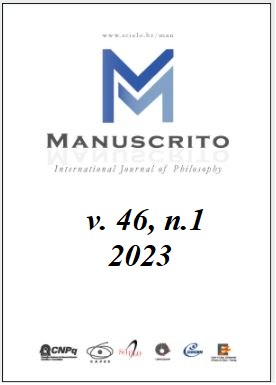Resumen
Una corriente reciente de la epistemología concede especial relevancia a la ignorancia en el marco de una teoría epistemológica. De hecho, algunos quieren otorgar un papel significativo a la ignorancia en la teorización epistemológica. En este artículo, argumentamos que un tipo particular de ignorancia, que implica el reconocimiento del hecho de que uno es ignorante, es fundamental para la adquisición de conocimiento dada la estructura epistémica de la sociedad. Está claro, sostenemos, que Sócrates se dio cuenta de la relevancia de lo que llamamos "ignorancia socrática" en la adquisición del conocimiento y era consciente de la división del trabajo epistémico y cognitivo que encontramos en nuestra sociedad. Explicaremos la forma en que entendemos esta ignorancia socrática, en contraposición a lo que llamaremos 'ignorancia contumaz' y el papel que esta ignorancia de tintes socráticos y rasgos de carácter afines puede desempeñar en la adquisición de conocimiento de los demás y con los demás.
Citas
Alcoff, L. 2007. ‘Epistemologies of Ignorance: Three Types’ in Sullivan, S., Tauna, N. (eds.) Race and Epistemologies of Ignorance, pp.39-58.
Baehr, J. 2015. Cultivating Good Minds: A Philosophical and Practical Guide to Educating for Intellectual Virtues. (MS) http://intellectualvirtues.org/why-should-we-educate-for-intellectual-virtues-2-2/
Bett, R. 2011. ‘Socratic Ignorance’, in Morrison, D.R. (ed.) The Cambridge Companion to Socrates, Cambridge: Cambridge University Press, 215-236.
Brickhouse, T.C., Smith, N.D. 2000. The Philosophy of Socrates, Boulder, Colorado: Westview Press.
Brickhouse, T.C., Smith, N.D. 2010. Socratic Moral Psychology, Cambridge, CUP
Coady, D. 2012. What to Believe Now. Chicester, Wiley-Blackwell, 212p.
Croce, M. 2017. ‘Expert-oriented abilities vs. novice-oriented abilities: an alternative account of epistemic authority’, Episteme 1-23.
Davidson, D. 2001. ‘First Person Authority’, in D. Davidson, Subjective, Intersubjective, Objective. OUP, 2001, 3-14.
Davidson, D. 2005. ‘Dialectic and Dialogue’, in D. Davidson, Truth, Language, and History, Oxford: OUP, 2005, 251-259.
De Brasi, L. 2015. Reliability and Social Knowledge-Relevant Responsibility. Transformacao 38(1):187-212.
Dunning, D. 2022. ‘The Trouble of Not Knowing What You Do Not Know: Psychological, Philosophical, and Societal Implications’, in N. Ballantyne and D. Dunning, Reason, Bias, and Inquiry. OUP, 2022, 205-226.
Fisher, M.; Goddu, M.; Keil, F. 2015. Searching for Explanations: How the Internet Inflates Estimates of Internal Knowledge. Journal of Experimental Psychology 144(3):674-687
Gadamer, H.-G. 1999. Die Idee des Guten zwischen Plato und Aristoteles, in Gadamer, H.G., Gesammelte Werke 7. Griechische Philosophie III, Tübingen, J.C.B. Mohr (Paul Siebeck), 1999.
Giannantoni, G. 2005. Dialogo socratico e nascita della dialettica nella filosofia di Platone (edizione postuma a cura di B. Centrone) Napoli: Bibliopolis.
Gill, C. 2004. ‘Afterword: Dialectic and the Dialogue Form in late Plato’, in Christopher Gill, Mary M. MacCabe (eds.) 2004. Form and Argument in Late Plato, Oxford: Clarendon Press, 283-311.
Gill, C. 2007. ‘Form and outcome of arguments in Plato’s Gorgias’, in Michael Erler, Luc Brisson (eds.) Gorgias-Menon. Selected papers from the Seventh Symposium Platonicum, Sankt Augustin: Academia Verlag, 62-65.
Goldberg, S. 2011. The Division of Epistemic Labor. Episteme 8:112-125.
Goldman, A. 2001. Experts: Which Ones Should You Trust? Philosophy and Phenomenological Research 63(1):85-110.
Goldman, A.I, Olsson, E.J. ‘Reliabilism and the Value of Knowledge’, in Adrian Haddock, Alan Millar, & Duncan Pritchard (eds.) Epistemic Value, Oxford: Oxford University Press, 2009: 19-41.
Hoffrage, U. 2016. Overconfidence. In POHL, R. (ed.) Cognitive Illusions. London, Routledge.
Keil, F.; Stein, C.; Webb, L.; Billings, V.D.; Rozenblit, L. 2008. Discerning the Division of Cognitive Labor: An Emerging Understanding of How Knowledge Is Clustered in Other Minds. Cognitive Science 32(2):259-300.
Kidd, I. 2016. Educating for Intellectual Humility. In Baehr, J. (ed.) Intellectual Virtues and Education. London, Routledge . pp.54-70.
Kruger, J.; Dunning, D. 1999. Unskilled and Unaware of It: How Difficulties in Recognizing One’s Own Incompetence Lead to Inflated Self-Assessment. Journal of Personality and Social Psychology 77(6):1121-1134.
Le Morvan, P., Peels, R. ‘The Nature of Ignorance: Two Views’, in R. Peels, M. Blaauw (eds.) The Epistemic Dimensions of Ignorance, Cambridge: CUP, 2016, 12-32.
Lutz, D.; Keil, F. 2002. Early Understanding of the Division of Cognitive Labor. Child Development 73(4):1073-84.
McPartland, K. 2013. ‘Socratic Ignorance and Types of Knowledge’, in J. Bussanich & Nicholas D. Smith (eds.) The Bloomsbury Companion to Socrates, London-New Delhi-New York-Sydney: Bloomsbury, 94-135.
Medina, J. 2013. The Epistemology of Resistance. Oxford, OUP, 332p.
Mercier, H. 2017. Confirmation bias-myside bias. In Pohl, R. (ed.) Cognitive Illusions. London, Routledge
Mercier, H.; Sperber, D. 2017. The Enigma of Reason: A new theory of Human Understanding. London, Allen Lane.
Nottelmann, N. 2016. ‘The Varieties of Ignorance’ in R. Peels, M. Blaauw (eds.) The Epistemic Dimensions of Ignorance, Cambridge: Cambridge University Press , pp.33-56.
Oakes, H., Brienza, J., Elnakouri, A, and Grossmann, I. 2019. ‘Wise Reasoning: Converging Evidence for the Psychology of Sound Judgement’, in R. Sternberg and J. Gluck, The Cambridge Handbook of Wisdom. CUP, 2019, 202-225.
Peels, R., Blaauw, M. ‘Introduction’, in R. Peels, M. Blaauw (eds.) The Epistemic Dimensions of Ignorance, Cambridge: Cambridge University Press , 2016: 1-11.
Penner, T., Rowe, C. 2015. Plato’s Lysis, Cambridge, Cambridge University Press.
Pritchard, D. 2015. Epistemic Dependence. Philosophical Perspectives 29:305-324
Pritchard, D. ‘Ignorance and Epistemic Value’, in R. Peels, M. Blaauw (eds.) The Epistemic Dimensions of Ignorance, Cambridge: Cambridge University Press , 2016, 132-143.
Roberts, R.; Wood, J. 2007. Intellectual Virtues. Oxford, OUP , 340p.
Ryan, S. 2012. ‘Wisdom, Knowledge and Rationality’. Acta Analytica 27, 99-112.
Simon, J. 2015. Distributed Epistemic Responsibility in a Hyperconnected Era. In: L. Floridi (ed.), The Online Manifesto. Dordrecht, Springer, p.145-160.
Siegel, H. 2017. Education´s Epistemology: Rationality, Diversity and Critical Thinking. Oxford, OUP , 296p.
Sloman, S.; Fernbach, P. 2017. The Knowledge Illusion: Why we never think alone. London, Macmillan, 296p.
Sullivan, S., Tauna, N. 2007. Race and Epistemologies of Ignorance. Albany, SUNY Press, 276p.
Townley, C. 2011. A Defense of Ignorance. Lanham, Lexington, 152p.
Wagenknecht, S. 2017. A Social Epistemology of Research Groups. Dordrecht, Springer , 187p.
Williams, B. 2002. Truth and Truthfulness. Princeton, Princeton University Press, 344p.
Zagzebski, L. 2012. Epistemic Authority: A Theory of Trust, Authority, and Autonomy in Belief. New York, OUP, 304p.

Esta obra está bajo una licencia internacional Creative Commons Atribución-NoComercial 4.0.
Derechos de autor 2023 Manuscrito: Revista Internacional de Filosofía


